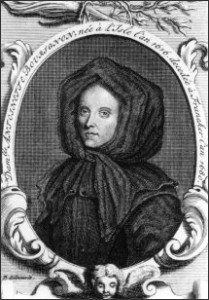
Antoinette Bourignon (1616-1680) was born January 13th, 1616, to a Flemish family in Lille, France. At a time when established religions did not allow women leaders, Bourignon became one of a number of prominent female theologists – among them, Anna Maria van Schurman, with whom Bourignon exchanged letters. Bourignon claimed variously to be the second Eve, heir of Christ and the Virgin Mary, and a vessel through which God passed his understanding unto people, and in 1648 Bourignon wrote,
Nowadays men are less disposed to receive divine illuminations than are women because in their pride their hearts are puffed up to apply all the glory and authority to themselves instead of referring it to God; and they cannot endure that a simple woman, such as I am, speaks of divine matters. (Le Temoignage de Verité 2, Quoted in Irwin)
As a young woman, Bourignon fled home when her father, a wealthy Catholic merchant, promised her in marriage. Bourignon escaped in the middle of the night disguised as a man, but was caught and returned home by soldiers. Shortly after, Bourignon fled a second arranged marriage. Wanting to avoid the convent, whose organization she thought impeded divine connection, she sought to settle a reclusive community for spiritual women. Although the Archbishop of Cambray granted her permission, he reversed his decision and Bourignon returned to Lille. She lived in privacy until 1653, when she was appointed governess of l’Hôpital Notre-Dame des Sept Douleurs for poor girls. After nine years Bourignon fled amid accusations of abuse (some said sorcery) and landed in Mechlin, where she gathered followers into a religious commune. Bourignon challenged Church doctrine and the authority of scriptural interpretation, advocating a direct, personal relationship with God. As her teachings became a perceived threat to Church authority, she was denounced by Papal Commission and the Church of Scotland, whose ministers were required to publicly disavow ‘Bourignonism.’
In 1669 Bourignon acquired a printing press and published religious tracts that became known throughout the Netherlands, France, England, and most especially Scotland, where she gained following among a group associated with Quietism. In 1671, Bourignon briefly joined the ousted Dutch Reformist Jean de Labadie in Amsterdam, with whom Anna Maria van Schurman was also associated, and published her ecclesiastical critique, “The Testimony of Truth.” Local authorities confiscated Bourignon’s press and, with the help of Princess Elizabeth of Palatine, she was appointed head of a hospital by the baron of Lutsburg. In 1679, Bourignon was charged with sorcery and fled once more, to Hamburg. She died the next year. Her autobiographical works, La Parole de Dieu, La Vie Extériuere de Damlle Antoinette Bourignon, and La Vie de Damlle Antoinette Bourignon were published posthumously by her disciple Pierre Poiret, who continued to spread her ideas until his death. After 1720, Bourignon’s name largely faded from historical consciousness, although the Formula of the Church of Scotland referred to ‘Bourignian’ heresy until 1889.
Source:
Irwin, Joyce. “Anna Maria von Schurman and Antoinette Bourignon: Contrasting Examples of Seventeenth-Century Pietism.” Church History 60.3 (1991): 301-315.
Bibliography:
“Antoinette Bourignon.” Encyclopaedia Britannica, 2013.
Bartholomew, Rebecca. “Antoinette Bourignon.” Distinguished Women of Past and Present. Danuta Bois, 1997.
“Bourignon.” Christian Classics Ethereal Library. Calvin College, 2004.
Bourignon, Antoinette. “Le Temoignage de Verité 2.” Oeuvres Vol. 13. Amsterdam, 1684.
de Baar, Mirjam. “Antoinette Bourignon.” Mary Hays, Female Biography; or, Memoirs of Illustrious and Celebrated Women, of All Ages and Countries (1803). Chawton House Library Series: Women’s Memoirs, ed. Gina Luria Walker, Memoirs of Women Writers Part II. Pickering & Chatto: London, 2013. vol. X, pp. .
Hays, Mary. Female Biography; or, Memoirs of illustrious and celebrated women of all ages and countries (6 volumes). London: R. Phillips, 1803.
Irwin, Joyce. “Anna Maria von Schurman and Antoinette Bourignon: Contrasting Examples of Seventeenth-Century Pietism.” Church History 60.3 (1991): 301-315.
MacEwen, Alexander Robertson. Antoinette Bourignon: Quietist. London: Hodder and Stoughton, 1910.
Tags: Age of Discovery, Autobiographers, Baroque, Europe, Religious Thinkers
